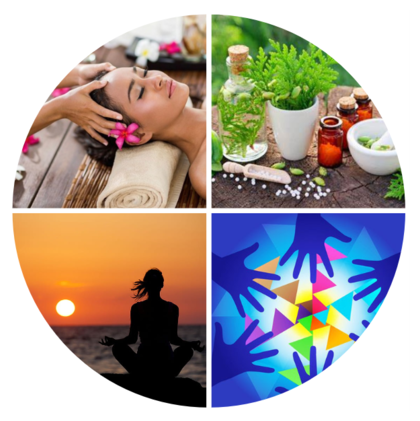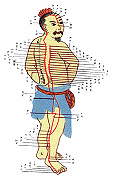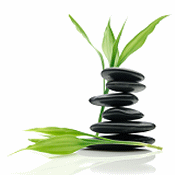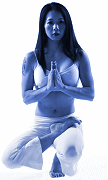Introduction to Holistic Medicine
The term holistic encompasses numerous therapeutic approaches ranging from healing, alternative medicine, Tai Chi, meditation, dowsing, or medical astrology. Interest in holistic medicine has grown enormously in recent years. More and more people are realizing the real benefits they can obtain from natural, intuitive, and traditional methods. The term holistic comes from the Greek “holos” and means “whole” or “unified”. It refers to an approach that considers living systems as a unit and that an organism is much more than the sum of its parts. Factors such as diet, environment, family history, and the psychic and psychological factors of the individual are taken into account.

Vital Energy This approach differs radically from orthodox medicine in that the emphasis in the latter is on the diagnosis and treatment of disease syndromes, usually considered in terms of local disorders affecting specific organs or parts of the body. However, in holistic medicine, spontaneous illness is considered as a general imbalance in the individual’s vital energy flow and can be corrected through natural healing methods and prescribing the optimal conditions in which the body’s self-healing process can occur. According to the holistic approach, illness is not something one suffers from, but something that is expressed. An individual is not ill because they have an ulcer but has developed an ulcer because they are ill.
This approach differs radically from orthodox medicine in that the emphasis in the latter is on the diagnosis and treatment of disease syndromes, usually considered in terms of local disorders affecting specific organs or parts of the body. However, in holistic medicine, spontaneous illness is considered as a general imbalance in the individual’s vital energy flow and can be corrected through natural healing methods and prescribing the optimal conditions in which the body’s self-healing process can occur. According to the holistic approach, illness is not something one suffers from, but something that is expressed. An individual is not ill because they have an ulcer but has developed an ulcer because they are ill.
 Balance
Balance
While orthodox doctors are interested in knowing the type of disease the patient has, holistic therapists are interested in knowing what kind of person is experiencing the disease. While the main objective of a conventional doctor is to diagnose the disease by knowing symptoms such as pain, swelling, rashes, and others, the main objective of a holistic therapist is to know as much as possible about the patient’s background, not only their medical history, but also their lifestyle, diet, mental state, ambitions, or creativity. Disease and vulnerability to infections, etc., are considered a consequence of a deeper or more general imbalance.
Mind and body
 In holistic medicine, the mind and body are considered an integral function rather than independent mechanisms. Emphasis is placed on mental and emotional states and the effect they have on health and well-being. Another characteristic of holistic medicine that sets it apart from the orthodox or allopathic approach is the importance it places on prevention. While most conventional doctors only see their patients when they are sick, most holistic therapists prefer to see their patients regularly, whether they are ill or not. Holistic medicine aims to eliminate the causes of disease and strengthen the body’s resistance to it, while conventional medicine is more concerned with suppressing and controlling symptoms.
In holistic medicine, the mind and body are considered an integral function rather than independent mechanisms. Emphasis is placed on mental and emotional states and the effect they have on health and well-being. Another characteristic of holistic medicine that sets it apart from the orthodox or allopathic approach is the importance it places on prevention. While most conventional doctors only see their patients when they are sick, most holistic therapists prefer to see their patients regularly, whether they are ill or not. Holistic medicine aims to eliminate the causes of disease and strengthen the body’s resistance to it, while conventional medicine is more concerned with suppressing and controlling symptoms.
Alphabetical Listing of Holistic and Complementary Therapies
Below, you can find a brief description of the most popular holistic, complementary, and alternative disciplines and therapies. Please note that most therapists use a combination of different techniques, and some therapies are more effective than others in treating each condition.
Essential Oils – Practically the same as aromatherapy (in fact, therapists use the terms interchangeably), but while in aromatherapy the main method of delivery is inhalation, in essential oil therapy, oils are often applied directly to the skin, sometimes in combination with therapeutic massages.
Acupressure – Ancient healing technique in which fingers are used to apply pressure to key points on the skin surface to stimulate the body’s natural self-healing ability through an electrical channel called meridian.
Acupuncture – Insertion of needles into specific points on the body to improve health and well-being by activating the body’s bioelectrical energy channels (or chi) that flow through the body in channels called meridians. Acupuncture originated in China over 2,000 years ago.
Aquatherapy – Aquatherapy consists of a program of exercises performed in water. It is used in the treatment of various disorders. The physical properties of water are used to assist in the patient’s healing and exercise performance. It is often combined with thermal water therapy.
Aromatherapy – Technique by which the aroma of natural oils extracted from medicinal plants is breathed in to improve psychological and physical well-being. The inhaled aroma of these essential oils is believed to stimulate areas of the brain associated with regeneration and self-healing.
Biomagnetism – Also known as biomagnetic pair therapy or magnetotherapy, it is a 5000-year-old Chinese method that uses magnets to manipulate the body’s magnetic field with the aim of reducing pain and recovering health.
Crystal Therapy – Ancient therapeutic approach based on the belief that crystals have positive and healing energy. Treatment usually involves the placement of crystals or gems on various parts of the body, which often correspond to the chakras, thus removing obstructions in the body’s electromagnetic field.
Dance Therapy – Form of expressive therapy also known as movement and dance therapy (DMT). It is based on the principle that the body and mind are interrelated and interconnected. The method involves the psychotherapeutic use of movement and dance in the treatment or prevention of emotional, behavioral, and physical disorders.
Dietetics – Study of the relationship between nutrition and health, and the application of nutritional principles to food planning and preparation and diet regulation in relation to health and disease. An important part of dietetics is modifying the diet to treat specific medical problems related to dietary intake.
Exercise and Fitness – Basically, any regular physical activity program, or a combination of activities that improves or maintains physical fitness and contributes to overall health and well-being. In holistic fitness approaches, the emphasis is generally placed on exercises that promote mind-body coordination, such as yoga, Tai Chi, etc.
Feng Shui – Ancient Chinese art of organizing the environment in order to attract the positive energy of life, or chi. Feng Shui is also described in ancient texts as “the art and science of healing spaces.” The goal is to unlock obstructions so that chi flows smoothly, achieving balance, good health, and prosperity.
Bach Flowers – System devised by British homeopath Dr. Edward Bach that uses preparations of flower materials to treat spiritual and emotional disorders such as depression, anxiety, insomnia, and stress. There are 38 Bach flower remedies or combinations, the most well-known being the “Rescue Remedy” for crisis made of five flowers.
Homeopathy – A system of medicine that involves treating the individual with highly diluted substances, with the aim of activating the body’s natural healing system. The basic method involves identifying and administering, in highly diluted form, a substance that produces identical symptoms in a healthy person to those of the patient.
Hypnotherapy – A therapeutic approach that uses a series of techniques to achieve deep relaxation and an altered state of consciousness in the patient during which they are highly sensitive to ideas, suggestions, and affirmations. Ideas implanted during hypnosis can have a powerful effect on both the body and mind.
Iridology – A diagnostic technique that involves correlating the markings and patterns of the iris with malfunctioning of specific organs in the body. It is often used in combination with dietetics, herbal medicine, etc. Generally, iridologists believe that the state of the eye reflects the overall state of the patient.
Applied Kinesiology (AK) – A highly intuitive technique for diagnosis and therapy determination based on the interpretation of information about the functional state of the body (mostly “muscle testing” for allergies and nutrient deficiencies). It should not be confused with kinesiology, which is the scientific study of movement (primarily human).
Ayurvedic Medicine – The traditional medicine of India, which emphasizes the importance of restoring and maintaining balance in the body through diet, lifestyle, exercise, body cleansing, herbs, yoga, meditation, and massage. Disease is considered as a manifestation of imbalance, which hinders the flow of prana or life energy.
Biochemical Medicine – A therapeutic system devised by Dr. W.H. Schuessler, an important German chemist. Schuessler identified 12 salts in the cells that are considered essential for health. If the body has a deficiency of any of these salts, health is compromised and can only be restored by correcting this deficiency.
Herbal Medicine – The use of plants and plant extracts for medicinal purposes. Herbal medicine is effective in treating many disorders that often resist treatment with conventional medicine, such as asthma, eczema, rheumatoid arthritis, headache, menopausal symptoms, chronic fatigue, irritable bowel syndrome, among others.
Traditional Chinese Medicine (TCM) – A series of therapies including herbal medicine, acupuncture, and therapeutic massage, based on a conceptual system that includes five “phases” to describe interactions and relationships between phenomena. It is believed that the five phases reflect the structure of the cosmos.
Meditation – There are many forms of meditation, each with a different goal. Some people practice meditation as a technique for self-discovery and spiritual development, while others use meditation as a practical method for coping with stress. Scientific studies have shown that meditation can profoundly alter the body’s metabolism.
Naturopathy – An integrative approach based on the principle that bodily processes such as metabolism, growth, reproduction, and others, are regulated by an inner vital force, and that the human body has an innate healing capacity. Naturopathy is not limited to specific techniques, but generally focuses on diet and lifestyle.
Osteopathy – A therapeutic system based on the belief that most diseases are related to problems of the musculoskeletal system and that the structure and functioning of the body are interconnected. Osteopaths aim to restore correct musculoskeletal functioning of the body through manual manipulation, nutrition, and lifestyle modifications.
Pilates – A popular form of exercise, developed by Joseph Pilates, that emphasizes balanced development of the body through core strength, flexibility, and awareness in order to achieve efficient and graceful movement. The six principles of Pilates are: centering, control, flow, breath, precision, and concentration.
Psychotherapy – Personal counseling with a psychotherapist that may involve a series of psychological techniques based on building relationships, dialogue, communication, and behavior changes aimed at improving the mental health of the client or patient, or for improving relationships within a group or family.
Chiropractic – Diagnosis, treatment, and prevention of mechanical disorders of the musculoskeletal system, especially the spine, based on the principle that these disorders affect overall health through the nervous system. Treatment typically involves manipulation of the spine and other joints, along with exercises, massage, etc.
Radiesthesia – The ability to detect “radiation” emanating from the human body. According to the theory, all objects – and all human bodies – emit unique psychic emissions, or “radiations”, just as all electronic devices emit unique electrical signals. Thus radiesthesia is cited as the explanation for dowsing by rods and pendulums
Radiesthesia for Health – The use of radiesthesia techniques (divination with rods or pendulum) to diagnose illnesses, select optimal treatment, choose appropriate foods, or necessary nutritional supplements. The method is based on the principle that the body knows what is good for it, or what is causing health issues.
Radionics – An intuitive method of diagnosis and treatment at a distance using a Radionics Box. In Radionics, diseases and remedies are seen as having their own particular frequency or vibration, which can be expressed in numerical values, providing the means by which the practitioner identifies and treats disease at a distance.
Reflexology – A therapeutic system based on the belief that there are “reflex” areas on the feet and hands that correspond to specific organs and glands, and that specific manipulation and pressure on reflex points reduce and eliminate blockages in the corresponding glands or organs, thereby restoring a healthy balance.
Reiki – A technique for reducing stress and achieving deep relaxation that also benefits healing. It employs a technique commonly called palm healing and is based on the principle of “life force,” which is fundamental in all holistic approaches. Reiki therapists aim to transfer healing energy in the form of “ki” through the palms of the hands.
Shiatsu – Therapy based on the holistic system of traditional Chinese medicine, in which illness is understood as the result of imbalances in the natural flow of energy, or qi, throughout the body. Shiatsu therapists apply pressure with fingers and palms on energy pathways, called meridians, to enhance the flow of qi.
Tai Chi – A Chinese martial art practiced primarily for its health benefits, including stress reduction, improved circulation, decreased blood pressure, and longevity. Tai Chi exercises are believed to promote the free flow of qi energy throughout the body.
Alexander Technique – A technique to identify and prevent harmful posture habits that can cause or exacerbate stress, discomfort, pain, and low performance in physical tasks. By improving coordination, posture, breathing, and other factors, it increases energy and promotes a positive mental attitude.
Yoga – A series of traditional physical, mental, and spiritual disciplines originating in ancient India, aimed at the unification of mind, body, and spirit. While many people think of yoga solely as stretching exercises, classes may also include learning breath control, meditation, chanting, and other techniques.
Do you need help deciding which type of therapy is right for you? We offer a free counseling and referral service. Call or email us confidentially to discuss your questions. We’ll do our best to assist you in selecting the most suitable treatment, and if you’d like, we can connect you with a therapist in your area. You can reach us at the phone number 626518362 or click here to send us an email message.

